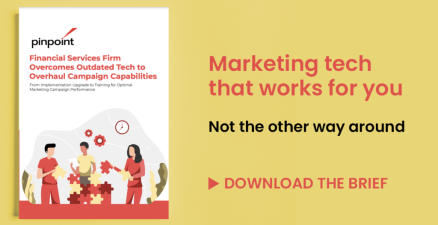AI in customer interactions isn’t new—but with all the buzz around agentic AI (systems that can take marketing actions on their own), the question is getting louder:

Can AI really drive meaningful engagement and deliver real marketing value?
The short answer: yes, when it’s done thoughtfully. Success depends on much more than plugging in a new platform.
Today’s AI tools do more than just answer customer questions. Platforms like Salesforce and Unica can personalize offers, guide customers through buying decisions, and even anticipate future needs—turning every interaction into an opportunity for cross-selling, up-selling, and loyalty building. AI can transform touchpoints into revenue multipliers and deepen customer relationships over time.
By 2030, 92% of marketing decisions in Fortune 1000 companies will be AI-influenced (Deloitte Digital). But while AI is getting smarter, real engagement still depends on how you use it. According to Salesforce, 73% of customers are open to AI—if it actually improves their experience. On the other hand, 60% say they’re concerned about companies using AI without transparency (IBM Institute for Business Value).
So, what makes AI-driven engagement actually work?
Data Quality and Availability
AI is only as smart as the data it’s trained on. For marketing to engage meaningfully — recommend the right product, personalize an offer, or send timely reminders — they need access to accurate, near real-time, and comprehensive data about your products, services, policies, and customer histories.
If your data is fragmented or outdated, AI campaigns won’t just miss the mark—they risk eroding trust.
How Pinpoint Does This:
- Conduct a data audit: identify gaps, inconsistencies, and outdated info in your knowledge base, CRM, and marketing documentation.
- Centralize customer data into a single, accessible source of truth (e.g., CDP or unified CRM).
- Create a structured taxonomy for marketing offers, calls to action, cross-selling and loyalty building actions, and more, so AI models can index information easily.
- Establish a data hygiene protocol—schedule regular updates and validations of product, policy, and support content.
Responsible AI Guardrails
Autonomous marketing tools can drive engagement—but they also need ethical and strategic boundaries. Setting clear parameters around what your AI can and can’t do is critical—both to avoid unintended consequences and to protect your brand.
This includes ethical considerations (how decisions are made), escalation protocols (when to hand off to a human), and transparency (letting customers know they’re speaking with AI). Trust matters: remember, 60% of consumers are wary of AI when transparency is lacking (IBM, 2023).
How Pinpoint Does This:
- Define clear rules of engagement, what should AI try to achieve, when to hand off to a human.
- Create opt-in/opt-out options for customers who prefer human interaction.
- Build AI disclosure into your UX (e.g., “You’re chatting with an AI assistant”).
- Review your AI decision-making process for potential bias and unintended consequences.
- Create a robust design of experiment; for example testing the new experience on 5% of your customers, enabling you to measure, monitor and decide when and if to expand
Balancing Automation with Human Creativity
AI is great at handling high-volume, low-complexity tasks like segmenting audiences or suggesting content. But it’s not a substitute for human connection—especially when emotions run high or the situation requires nuance. The best approach is a blend: let AI handle the basics, and let your human team focus on complex issues where they add the most value. This isn’t just theory: companies that combine AI with human agents see a 61% boost in customer satisfaction and a 68% drop in average handle time (Zendesk, 2024).
How Pinpoint Does This:
- Use AI for triage: route transactions based on complexity, urgency, or sentiment.
- Develop clear workflows that show when and how a human takes over.
- Empower marketing teams with real-time AI support (e.g., suggested offers or next-best actions).
- Monitor handoff points closely—bad transitions kill trust.
Security and Compliance Standards
AI-driven marketing often means deeper access to personal data. Make sure your systems are aligned with relevant regulations (like GDPR or HIPAA), and have internal processes in place to manage access and usage. A slip here can be costly. According to PwC, 32% of customers would stop doing business with a brand they love after just one bad experience—and mishandling their data definitely counts.
How Pinpoint Does This:
- Map out all customer data touchpoints AI will interact with.
- Ensure AI vendors and tools meet regulatory standards like GDPR, HIPAA, CCPA, etc.
- Implement role-based access control for any sensitive data AI can access.
- Log and audit AI decision-making and data use for compliance tracking.
- To reduce risk exposure, consider a blended model that uses public and private AI models
Change Management and Training
Even the best AI won’t create value if your team doesn’t know how to use it—or if roles aren’t clear. People need to understand how to work with the technology, how their roles may shift, and how to handle exceptions when AI falls short. Clear communication, role clarity, and ongoing support can make the difference between confusion and a smooth transition.
How Pinpoint Does This:
- Run internal workshops to explain how tech will help your marketing evolve. support (not replace) your team.
- Provide hands-on training for agents to learn how to harness the capabilities of AI tools.
- Communicate changes in roles and responsibilities early and often.
- Establish a feedback loop—let employees report what’s working and what needs adjustment.
How to ensure AI isn’t just another failed martech promise
Agentic AI isn’t just the future of marketing—it’s already reshaping how businesses engage with their customers today. But getting real results takes more than buying a platform. It requires strategy, structure, and a partner who understands how to connect the dots between technology, data, and experience.
That’s where Pinpoint comes in.
We help businesses build marketing systems that don’t just check a box—they build profitable customer connections. From aligning your data and systems to crafting a human-first customer experience, we guide every step of your readiness journey. Whether you’re just exploring automation or ready to scale, we meet you where you are and move fast.
If you’re serious about using AI to improve—not complicate—your marketing, let’s talk.












